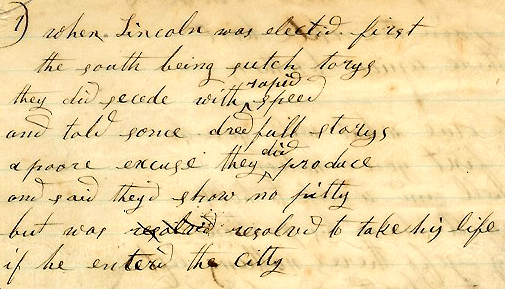
Lyrics sung to the tune “Yankee Doodle” alluded to the pre-inauguration plot against Lincoln (SC 2264)
Prior to 1937, Inauguration Day for U.S. presidents was March 4. On that day in 1861, there was great excitement, but also grave uncertainty. Abraham Lincoln took office at a time of national crisis, with the South in the midst of secession and Lincoln himself the recent subject of a rumored assassination plot. Soon after his swearing-in, tensions only escalated with the attack on Fort Sumter and the secession of Virginia in April.
Collections in the Manuscripts & Folklife Archives holdings of WKU’s Department of Library Special Collections afford a glimpse at the mixed emotions the new president elicited from Americans. In August, a letter to Barren County, Kentucky merchant Wade Veluzat from a Lincoln voter denied that either he or his candidate were abolitionists. “But,” he wrote, “if the people of the South will make war on us because we vote for whom we please for President, then let it come.” In September, a defiant secessionist in Russellville, Kentucky took up the challenge in a letter sent to Ohio. “We are not afraid of the Lincoln Negro Party, we say whip us if you can.”
Four years later, Lincoln’s first-term record drew a similarly wide range of comment. As we have previously seen, Bevie Cain of Breckinridge County had nothing but scorn for supporters of the President’s “wicked unwise rule.” She dared a Unionist friend to “just tell me one item of good that his reign has accomplished or will accomplish.” An Indiana man was on the other side of the fence, finding Lincoln to be, in fact, insufficiently radical. He expected, nevertheless, to vote for the reelection of “old Abe,” observing presciently that he “is a good honest man, and has already said and done enough to make his name famous among the friends of universal Liberty everywhere and for all time.”
Click on the links to access finding aids for these collections. For more on Lincoln, presidents and presidential inaugurations, search TopSCHOLAR and KenCat.
